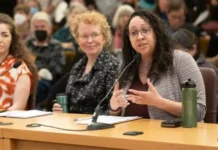
Portland leaders praised the expansion of the Street Response team as necessary step to to provide better outcomes for people experiencing a mental health crisis and reduce the heavy call load for the city’s public safety bureaus. A press conference was held in front of downtown’s Fire Station 1.
A Portland State University’s Homelessness Research & Action Collaborative recommended in October the program go citywide. This was the recommendation after a six-month evaluation by a team of researchers. Commissioner Hardesty said she believed the program now had “100% support” from the entire city council.
The excitement by some is due to the nonviolent nonpolice focus of the program. Now people across Portland looking to assist someone in a mental health crisis have a new option: They can call 911 and ask for the Portland Street Response. The unarmed emergency response program now serves the entire city. This allows the police alternative to operate inside of Portland’s entire 145 square miles.
Commissioner Jo Ann Hardesty, the architect behind the program, said that the program is the first major update to the city’s public safety system in over a century. The program is housed within the Portland Fire Bureau. The team consist of a firefighter paramedic, a mental health crisis therapist and two community health workers to respond to emergency calls that don’t require a police response.
Mayor Ted Wheeler said he believed it would allow police to “refocus” on violent criminals and beef up the city’s ability to address the mental health crises that play out every day on Portland’s streets. The program has been expanding methodically for the last year.
The idea was to send the right responders to the right calls with the right training. The mayor said that this was the best way to meet the needs of those who are suffering on our streets. Portland Street Response manager Robyn Burek said teams had been quietly responding to calls citywide for the past few weeks.















